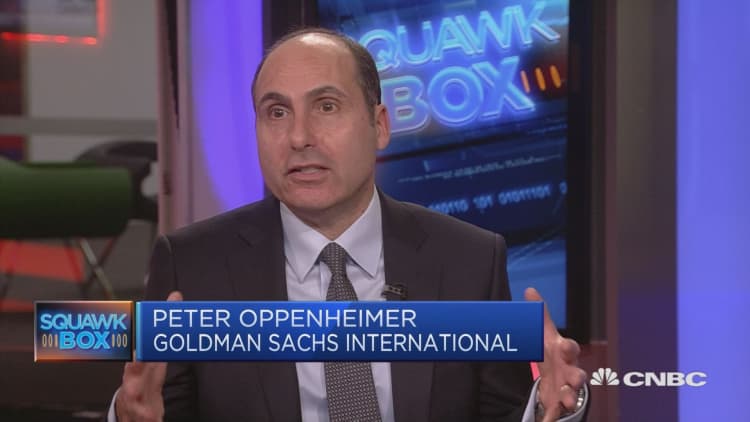
It is unlikely that stock markets will enter an interrupted period of falling prices, a strategist at Goldman Sachs told CNBC Wednesday, despite ongoing talk of an impending slump for equities.
Some market players have begun wondering whether stock valuations have reached a peak, following a recent sell-off, which could then lead to a recession. They are worried that new regulation in the tech sector will limit profits, as well as higher interest rates, lower growth momentum and a potential trade war. However, according to Goldman Sachs, there is little evidence that there will be a recession soon.
"Without interest rates and inflation expectations really rising very much, it is difficult to see the triggers for a recession anytime soon," Peter Oppenheimer, chief global equity strategist and head of macro research at Goldman Sachs International, told CNBC Wednesday.
"And it is really a recession or fear of profits falling that is the usual trigger for a sustained bear market (in stocks) and we don't see those risks as being very high," he added.
The investment bank advised customers to ignore one of its market indicators: the bear/bull market scenario, which currently sits at above 70 percent — a level usually deemed as risky for equity investors. The scenario takes into account growth momentum, the yield curve, core inflation, unemployment and stock valuations. But Goldman Sachs said that this indicator is only at such high levels because of low unemployment and lower growth momentum.
"We're not ignoring it," Oppenheimer told CNBC, "but the monetary components that underlie this indicator are still suggesting the risks are pretty low," he said in reference to core inflation numbers and the pace of higher interest rates.
Another indicator proving that stocks are unlikely to fall in price soon is the current level of valuations. "If you look at the companies' ability to generate cash now, partly because they are using much less capital it's very high so free-cash yield in all the major markets are way above average and that suggests there is still a decent underpinning of valuations," Oppenheimer told CNBC.
Nonetheless, other analysts believe that stock markets are at a turning point, with some projecting a correction of 30 percent in prices.
Steen Jakobsen, the often-bearish chief economist at Danish investment house Saxo Bank, told CNBC last week that growing credit loans, a widening fiscal deficit in the U.S., doubts over infrastructure spending plans and a potential trade war indicate a potential sudden economic recession and a crash in markets.


